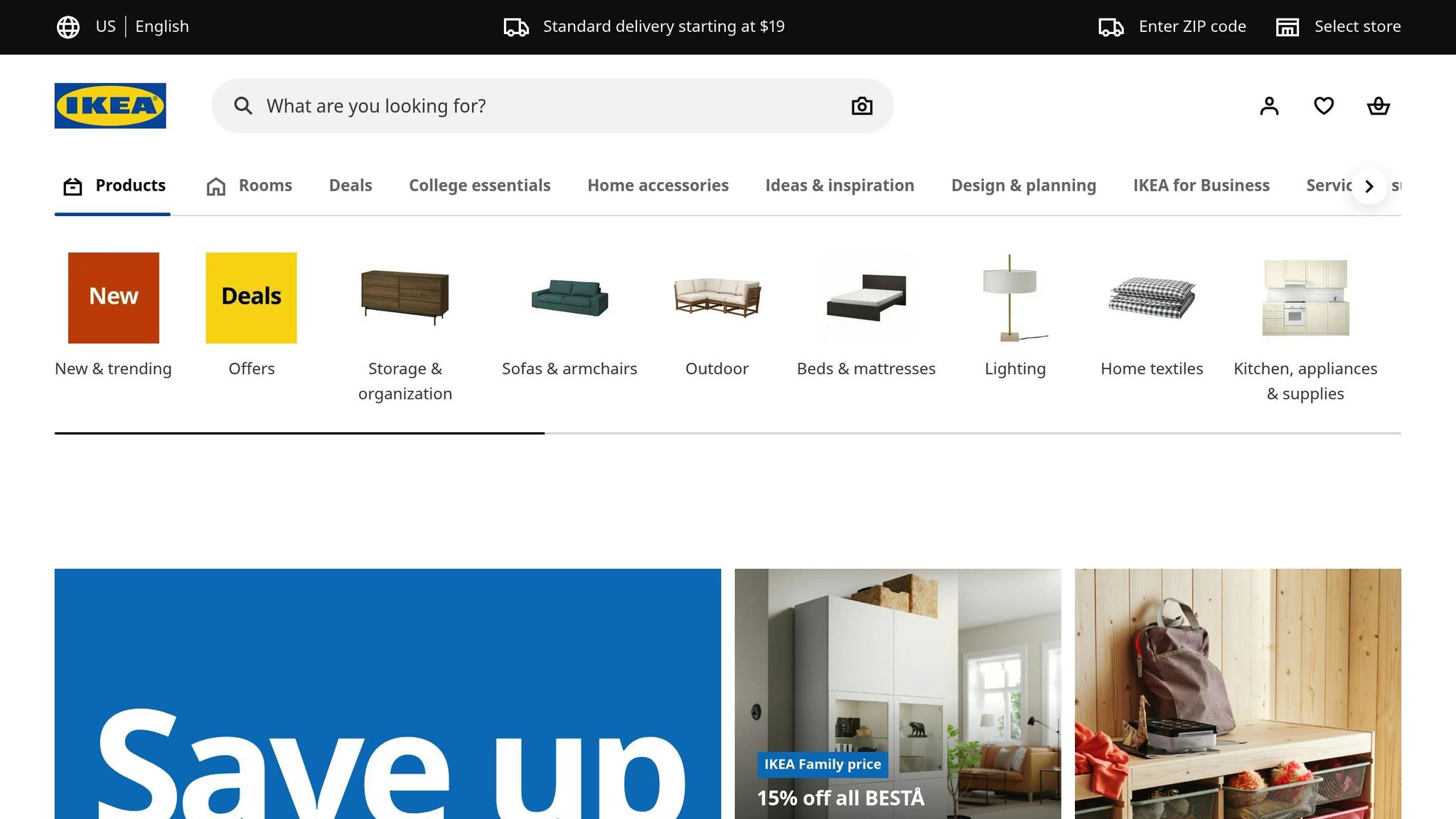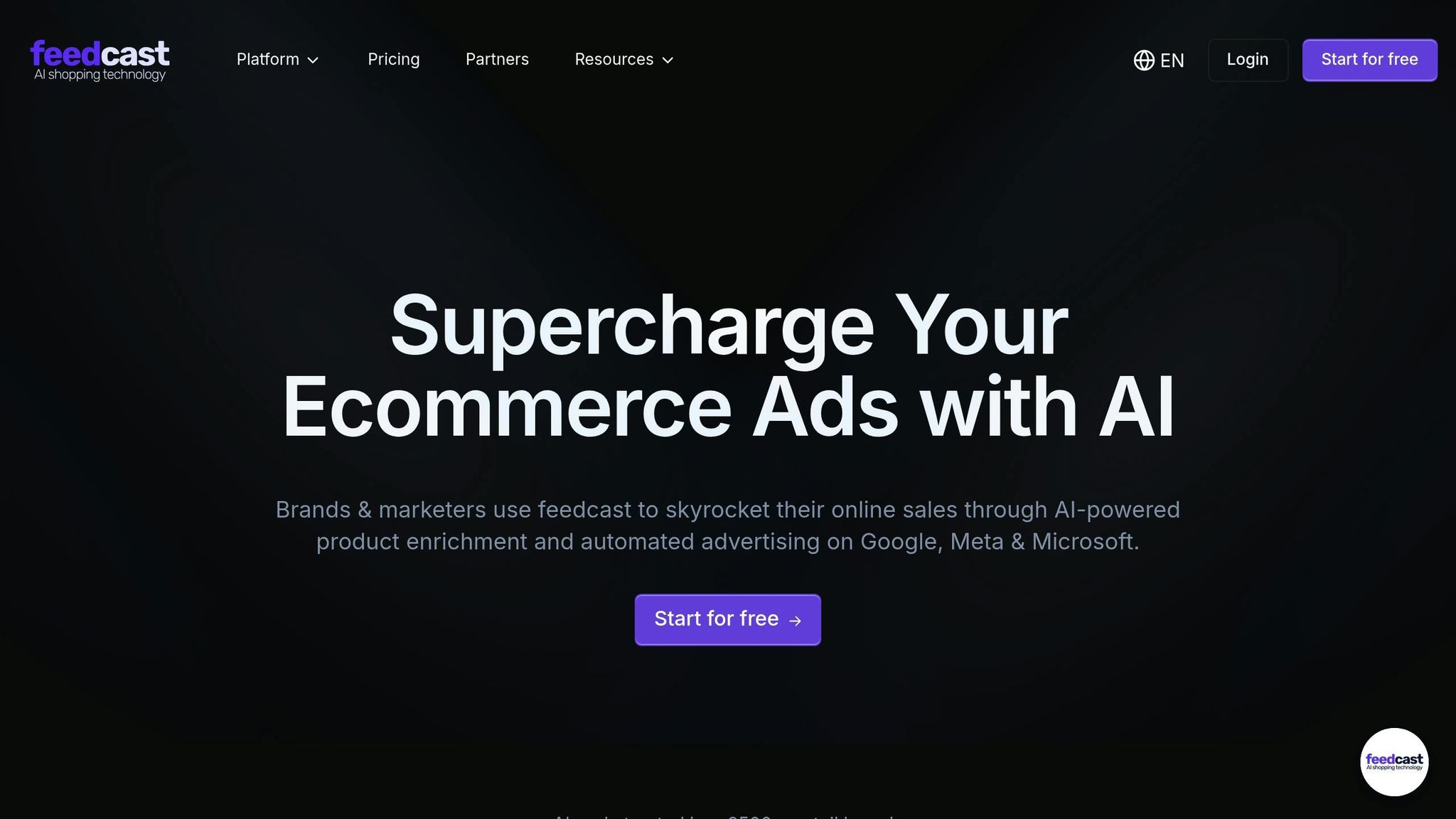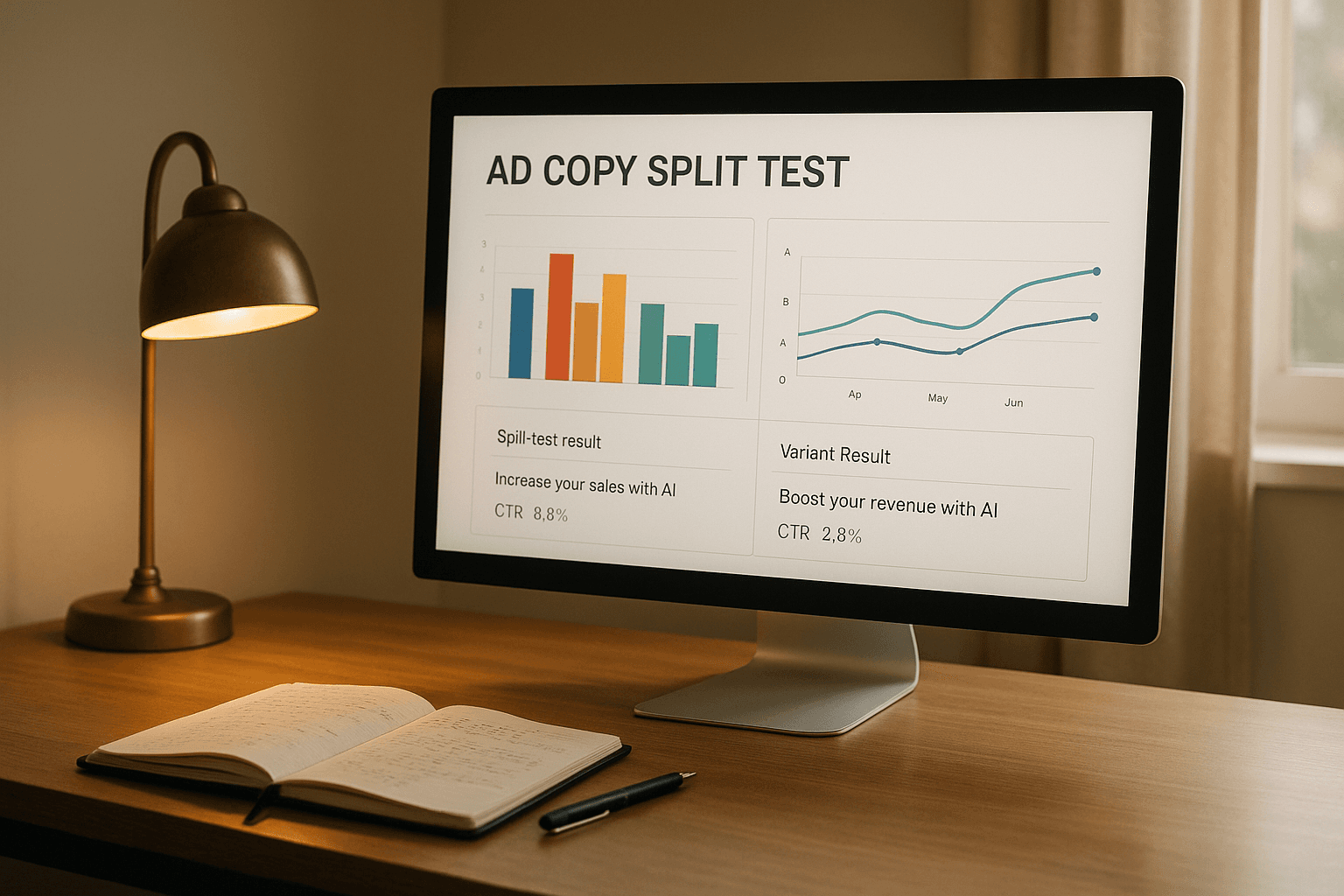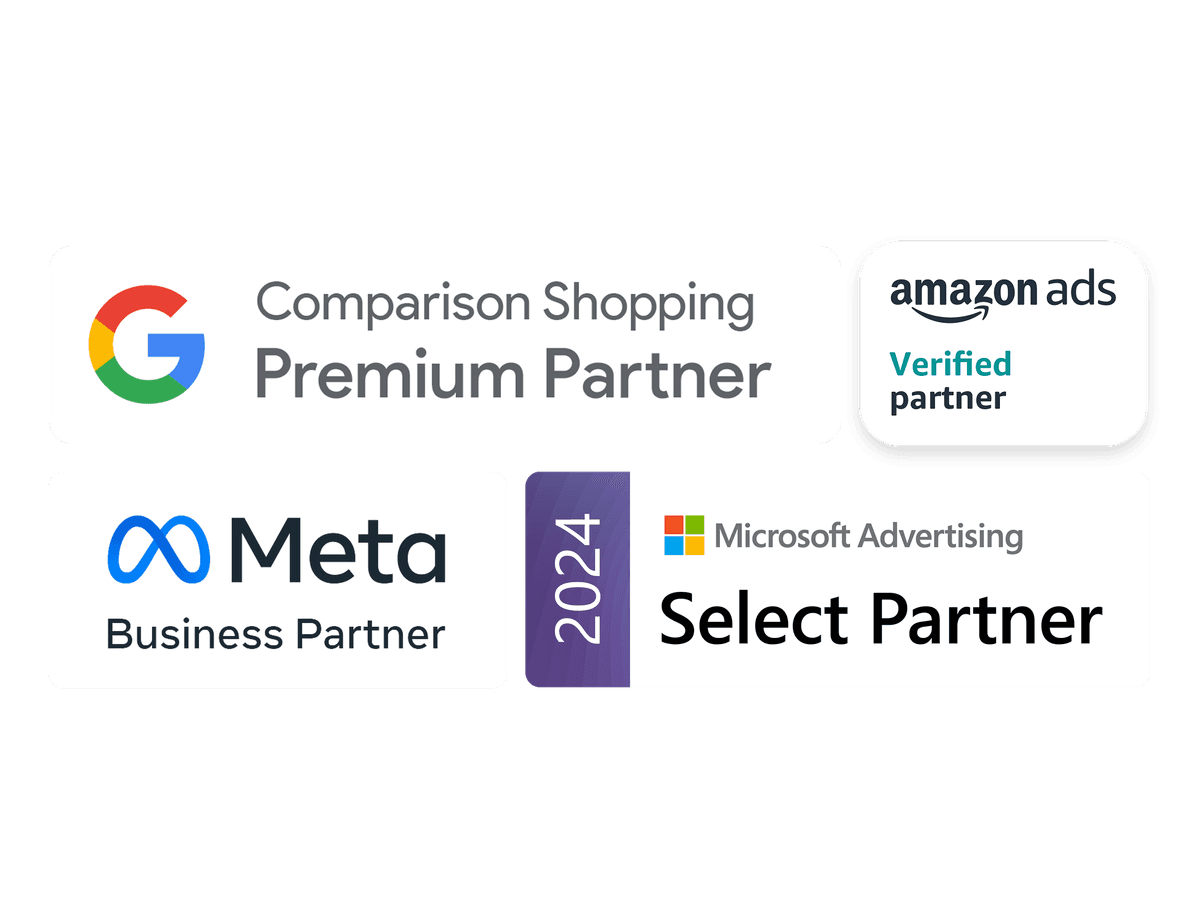How AI Improves Ad Copy Testing
Explore how AI revolutionizes ad copy testing, enhancing speed, personalization, and cost efficiency while maintaining ethical standards.
Ad copy testing has always been a time-consuming and resource-heavy process. But AI is changing the game. Here's how:
- Speed: AI tools analyze data and test ad variations in hours, not weeks.
- Scale: AI generates and tests hundreds of ad copy variations simultaneously.
- Personalization: AI tailors ads to specific audiences in real time.
- Cost Efficiency: Businesses report up to 30% lower customer acquisition costs.
- Multi-Channel Optimization: AI adjusts content to fit platform-specific behaviors.
Platforms like Feedcast make this process easier by managing ad accounts across platforms, generating optimized copy, and using real-time data to refine campaigns. While AI delivers faster insights and better performance, human oversight is still essential to maintain brand voice and ethical standards.
Revolutionizing Ad Copy Testing with AI: Real Results with IKEA

Recent Research on AI-Driven Ad Copy Testing
Recent research highlights how AI-powered ad copy testing is transforming the advertising landscape by delivering faster, more efficient, and cost-effective results compared to traditional methods.
Key Findings on AI's Impact
AI-driven ad copy testing has significantly reduced the time it takes to generate actionable insights. While manual A/B testing often requires weeks to yield results, AI-powered platforms can deliver insights in a fraction of that time. This speed allows marketers to make quicker decisions and adapt campaigns on the fly.
Companies adopting AI for ad copy testing have reported noticeable improvements in both conversion rates and return on investment (ROI). For example, many e-commerce businesses have experienced measurable gains after transitioning from conventional methods to AI-driven approaches.
Another standout advantage is AI's ability to test a larger number of ad variations simultaneously. This expanded capacity opens up opportunities for exploring creative directions that would be too time-consuming or resource-intensive to manage manually. Automation also reduces costs by minimizing the need for extensive manpower and cutting down on errors.
AI-generated ad copy has shown strong performance across multiple advertising channels. This success stems from AI's ability to tailor messages based on platform-specific audience behaviors, ensuring that ads resonate with their intended audiences.
These findings provide a glimpse into the emerging trends that are set to shape ad copy testing as we move into 2025.
AI Ad Testing Trends for 2025
The use of generative AI in advertising continues to grow, with more marketing teams integrating AI into their workflows for ad copy testing. This trend is reshaping how campaigns are planned and executed.
Predictive analytics is playing a bigger role, using historical data and market trends to identify ad variations likely to perform well. This approach helps boost initial campaign success by narrowing the focus to high-potential options.
Modern AI systems are also becoming more dynamic, adjusting ad copy in real time based on user behavior and context. This adaptability leads to higher engagement rates compared to static ad strategies.
Advancements in natural language processing (NLP) have further refined AI's ability to create compelling ad copy. By analyzing industry trends, competitor messaging, and consumer sentiment, AI tools can craft messages that resonate deeply with specific audience segments, enhancing campaign effectiveness.
Another exciting development is multi-modal AI testing, which takes a comprehensive approach to ad optimization. These systems refine not only the text but also visual elements like images, color schemes, and layouts, resulting in more cohesive and impactful campaigns.
Finally, autonomous campaign management is gaining traction. AI systems are increasingly capable of managing the entire testing and optimization process with minimal human input. This shift saves marketers significant time while maintaining or even improving campaign performance.
How AI Improves Ad Copy Testing Processes
The move from manual testing to AI-driven processes has revolutionized ad copy testing. Advanced systems now handle everything - from creating variations to predicting performance - using tools like machine learning, natural language processing (NLP), and predictive analytics. What once took weeks can now be accomplished in a fraction of the time.
Platforms like Meta Ads and Microsoft Advertising have embraced this shift, integrating AI directly into their frameworks. These systems can suggest text variations and automatically optimize creative elements, allowing marketers to focus on strategy while AI handles the execution. With these advancements, AI is transforming every phase of ad copy testing into a faster, smarter process.
Automated Ad Copy Variations
AI platforms can quickly generate multiple ad copy versions by analyzing past performance and user engagement trends. This means marketers can provide just one ad, and the system will produce several optimized variations almost instantly.
Take Meta Ads' text variation suggestion tool as an example. Marketers input their original copy, and the AI identifies successful patterns from similar campaigns to create multiple testing options. This eliminates the need for manually crafting A/B test variations, saving time and effort.
AI also enables simultaneous testing of dozens of creative combinations. This expanded testing capacity allows marketers to explore ideas that would have been too resource-intensive to test manually, leading to more comprehensive optimization.
Predictive Analytics for Performance Optimization
Predictive analytics takes things further by using historical campaign data and real-time user behavior to estimate which ad copy variations will perform best - before the campaign even launches. It evaluates hundreds of factors, such as audience demographics, engagement trends, and conversion rates, to recommend the most effective options.
Campaigns using automated optimization have been shown to achieve up to 30% better cost per acquisition (CPA) compared to traditional manual methods[1].
AI systems like Brainsight's visual attention tool demonstrate the power of predictive analytics. With an impressive 94% accuracy rate, this tool identifies which parts of an ad will draw the most attention, delivering instant results. In contrast, traditional eye-tracking studies can take weeks[3].
By reducing reliance on guesswork, AI empowers marketers to make data-driven decisions. Instead of relying on intuition or limited past data, they can base their strategies on a comprehensive understanding of user behavior, content interaction, and intent signals. This precision leads to better conversion rates and a more efficient allocation of ad budgets. Beyond pre-launch predictions, AI can also refine messaging in real time to align with audience behavior.
Dynamic Ad Copy Personalization
AI takes personalization to the next level by segmenting audiences based on behavior, preferences, and intent in real time. This goes far beyond basic demographic targeting, enabling highly specific audience segments to receive tailored messaging.
Generative AI can craft messages for distinct groups or retarget users based on their past actions. For instance, an e-commerce site might show product-focused ads to users who browsed specific items, while serving broader category promotions to first-time visitors.
Personalization happens automatically as users engage with ads. AI continuously monitors engagement patterns and adjusts messaging to better match individual preferences. This ensures that each user sees the most relevant and compelling ad version, boosting engagement rates.
AI tools also optimize ad copy for different channels, ensuring the best possible performance across platforms. By leveraging first-party data and privacy-conscious algorithms, these systems maintain personalization effectiveness even as privacy regulations limit traditional tracking methods.
| AI Technique | Description | Primary Benefit |
|---|---|---|
| Automated Ad Copy Variations | AI generates multiple versions of ad copy for testing | Faster, scalable A/B and multivariate tests |
| Predictive Analytics | AI forecasts ad performance using historical and real-time data | Optimized spend, up to 30% better CPA |
| Dynamic Personalization | AI tailors ad content to individual user segments in real time | Increased relevance and engagement rates |
Benefits and Challenges of AI in Ad Copy Testing
AI has reshaped the way businesses approach ad copy testing, offering a mix of advantages and challenges. For e-commerce companies, understanding both sides of the coin is crucial to making informed decisions. Below, we explore the key benefits and hurdles that come with using AI in this space.
Benefits of AI in Ad Copy Testing
AI brings speed and efficiency to the forefront. Tasks that once required weeks can now be completed in minutes. With the ability to test hundreds of ad copy variations across multiple platforms simultaneously, AI dramatically accelerates the process.
Another standout advantage is data-driven precision. By analyzing large volumes of historical data, user behavior patterns, and real-time engagement metrics, AI eliminates guesswork and provides actionable recommendations based on actual performance.
When it comes to budgets, AI supports cost optimization. It identifies high-performing ad variations early in the process, allowing businesses to allocate their budgets more effectively and reduce their cost per acquisition.
AI also enables personalization at scale, crafting tailored messages for different audience segments. Without the need for manual effort, AI dynamically adjusts messaging based on factors like user behavior, demographics, and engagement history, creating more relevant and impactful experiences.
Challenges of AI in Ad Copy Testing
Despite its benefits, AI does come with its share of challenges. One common concern is creative control. Marketers often worry that AI-generated content might lack the human touch, brand voice, or creative flair needed to truly connect with audiences. Clear guidelines and oversight are essential to maintain consistency.
Data dependency poses another challenge. AI tools require high-quality data to function effectively. Businesses with limited or unreliable data may struggle to achieve the desired results.
Privacy and compliance issues are becoming increasingly complex. Regulations like the CCPA and other evolving standards restrict data collection, forcing AI systems to adapt to less detailed user information while still delivering personalized results.
For smaller businesses, technical complexity can be a barrier. Setting up AI tools, integrating them with existing systems, and interpreting the results often require specialized knowledge that smaller teams may lack.
Finally, there’s the risk of over-reliance. While AI excels at recognizing patterns and optimizing performance, it may overlook context, cultural nuances, or emerging trends that human marketers are better equipped to catch. Maintaining a balance between AI recommendations and human judgment is essential.
Comparison Table
| Aspect | Benefits | Challenges |
|---|---|---|
| Speed | Reduces time from weeks to hours | Requires learning new systems |
| Scale | Tests hundreds of variations simultaneously | Relies on high-quality data |
| Accuracy | Minimizes guesswork with data-driven insights | May miss cultural or brand-specific nuances |
| Cost | Improves ROI through better targeting | Includes setup and subscription expenses |
| Personalization | Delivers tailored messages to segments | Limited by privacy regulations |
| Creativity | Generates unexpected variations | Risk of losing brand voice |
| Resources | Frees up time for strategic work | Needs technical expertise to manage |
sbb-itb-0bd1697
Using Feedcast for AI-Powered Ad Copy Optimization

Feedcast.ai steps in to simplify the challenges of ad copy testing by combining AI-powered product enrichment with multichannel ad management. It allows businesses to test and optimize ads seamlessly across platforms like Google, Meta (Facebook and Instagram), and Microsoft Ads - all from one centralized dashboard. Here's a closer look at what makes Feedcast stand out.
Feedcast's AI Capabilities
Feedcast uses AI to enhance product titles, descriptions, and attributes, making ads more visible and effective. Instead of manually writing hundreds of product descriptions, the platform leverages existing data to generate optimized copy tailored to each advertising platform’s requirements.
It integrates smoothly with popular e-commerce systems like Shopify, WooCommerce, and PrestaShop, as well as data formats like Google Sheets, CSV, and XML. Plus, it automatically detects and corrects feed errors, reducing technical headaches for users.
For performance optimization, Feedcast offers tools to test ad copy variations and provides actionable insights to refine campaigns before they go live. As a Google CSS partner, Feedcast also delivers perks for Google Shopping campaigns, such as potential cost savings and improved visibility in shopping results.
Benefits for E-Commerce Businesses
Feedcast’s features deliver practical advantages for e-commerce brands, particularly in saving time and improving efficiency. By automating tasks that previously consumed hours of effort, U.S.-based e-commerce businesses can focus on strategy instead of manual processes.
The platform also drives better ROI by improving ad targeting and crafting more effective copy. Its AI analyzes vast amounts of product data to reveal patterns and opportunities that might otherwise go unnoticed. This leads to higher click-through rates and reduced customer acquisition costs.
For businesses managing large product catalogs or seasonal inventory, Feedcast’s scalability is a major plus. Its Premium plan, priced at $249/month (with a discounted first month at $149), supports up to 100,000 products and includes unlimited AI credits for ad copy generation and testing - offering flexibility as the business grows.
Additionally, Feedcast’s free channel broadcasting feature, which includes Google Shopping free listings, provides extra exposure without requiring additional ad spend. This is especially beneficial for smaller businesses aiming to expand their reach while keeping costs under control.
The platform’s pricing is designed to accommodate businesses of various sizes. The Autopilot plan, at $99/month, supports up to 1,000 products and includes 500 AI credits, making it an excellent choice for growing e-commerce stores. For those who want to explore Feedcast’s capabilities risk-free, there’s even a free plan available. Higher-tier plans also come with customizable dashboards, offering detailed analytics to support data-driven decisions.
Best Practices for Ethical AI Ad Copy Testing
AI-powered ad copy testing holds immense potential, but it also comes with a responsibility to ensure ethical and regulatory standards are upheld. As AI tools become increasingly adept at analyzing consumer behavior and crafting personalized content, businesses must strike a balance between effectiveness and accountability. While AI can make ad copy testing faster and more efficient, maintaining ethical practices is crucial to building trust and achieving sustainable success.
One of the most important principles in this space is transparency. Businesses should openly communicate when AI is involved in creating or optimizing advertising content. This doesn’t mean plastering "Created by AI" on every ad, but it does mean including clear disclosures in privacy policies and data collection notices. Being upfront about how AI is used fosters trust and ensures compliance with consumer expectations.
Data privacy compliance is another non-negotiable. U.S. laws like the California Consumer Privacy Act (CCPA) require companies to inform consumers about data collection practices and provide opt-out options. When using AI for ad copy testing, businesses must handle sensitive data - such as browsing habits, purchase history, or demographic details - with care and transparency.
Addressing bias prevention is critical. AI systems can unintentionally reinforce stereotypes or exclude certain groups if left unchecked. Regular audits are essential to catch and correct these biases. For instance, if an AI tool repeatedly associates specific products with certain demographics, human oversight should step in to ensure fairness and inclusivity.
Consumer consent goes beyond simply meeting legal requirements. Businesses should give users clear, detailed options for controlling how their data is used in ad personalization. When testing AI-generated ad copy, it’s important to offer meaningful choices about how personal information shapes the ads they see.
Even with advanced AI systems, quality control cannot be overlooked. Human reviewers should routinely evaluate AI-generated content to ensure it aligns with brand values, meets accuracy standards, and remains appropriate. This is particularly vital when testing ads at scale, as automated systems may prioritize performance metrics over ethical considerations.
Maintaining fair competition is another key concern. While AI can provide a significant edge in ad testing speed and optimization, businesses must avoid unethical practices like copying competitors’ ads too quickly or misleading consumers. Ethical practices ensure a level playing field in the market.
Data security takes on added importance with AI-driven ad copy testing, as these systems often rely on vast amounts of customer data and campaign metrics. Companies should implement strong security measures, such as encryption, access controls, and regular audits, to protect sensitive information. Any third-party AI tools should also meet strict enterprise security standards.
Algorithmic accountability is about taking ownership of AI decisions. Businesses should document how their AI systems operate and establish clear procedures for addressing any issues. For example, if AI-generated content produces problematic or unexpected results, there should be a process for human review and intervention.
The Federal Trade Commission (FTC) has made it clear that companies are fully responsible for the outputs of their AI systems. This means businesses cannot deflect blame onto AI for misleading or discriminatory ads. Staying proactive and adhering to the FTC’s guidance is essential to avoid regulatory pitfalls.
Building consumer trust through ethical AI practices isn’t just the right thing to do - it also pays off in the long run. When businesses respect privacy and handle data responsibly, they foster trust and engagement, which ultimately leads to better results.
Finally, conducting periodic ethical audits ensures that AI ad copy testing processes remain aligned with both legal requirements and broader ethical standards. These audits should evaluate the impact of AI-driven advertising on consumers and the market, with input from diverse stakeholders to uncover potential blind spots.
Investing in training and education for marketing teams is equally important. Teams should stay informed about both the capabilities and the ethical limitations of AI tools, as well as keep up with industry regulations and best practices as the technology evolves. This knowledge helps ensure that AI is used responsibly and effectively.
Conclusion
AI has reshaped the way ad copy testing is done, offering quick, data-driven solutions for creating and evaluating ad content [2]. It enables brands to personalize campaigns at scale and achieve measurable outcomes.
The results speak for themselves. Companies using AI for ad copy testing report a 30% improvement in cost per acquisition compared to older methods [1]. Top e-commerce brands have seen noticeable boosts in campaign performance, while smaller businesses have managed to achieve viral success on limited budgets. This shows how AI tools are leveling the playing field, giving brands of all sizes access to advanced advertising strategies.
However, success with AI-driven ad copy testing isn’t without its challenges. Businesses need to ensure compliance with data privacy laws, maintain transparency with their audiences, and keep human oversight in place to avoid issues like bias or a diluted brand message. Striking the right balance between automation and human control is crucial - using AI’s speed and efficiency without losing sight of strategic decision-making.
For e-commerce businesses, platforms like Feedcast offer a streamlined way to tap into AI's potential without added complexity. Feedcast integrates automated ad copy creation, predictive analytics, and multi-channel management across platforms like Google, Meta, and Microsoft Ads. Its features, such as AI-powered product feed optimization and real-time performance tracking, help brands save time and boost ROI. This makes advanced ad optimization accessible to everyone, from small businesses to larger agencies.
As AI in ad copy testing continues to advance, the focus is shifting toward privacy-friendly targeting and the use of first-party data. These innovations aim to make ads feel more natural and relevant while respecting consumer privacy [4]. Businesses that adopt AI tools now will be better equipped to adapt to these changes and stay ahead in the competitive advertising landscape.
AI isn’t just a tool - it’s becoming a necessity for thriving in today’s digital marketing world.
FAQs
How is AI transforming the way ad copy is tested and optimized?
How AI is Changing Ad Copy Testing
AI is transforming the way marketers approach ad copy testing by making the process faster and more efficient. Traditional methods often involve manually testing a small number of variations, which can be time-consuming and limiting. In contrast, AI can evaluate hundreds of ad copy variations at the same time, helping marketers pinpoint the best-performing options in record time.
What’s more, AI delivers real-time insights and ensures ongoing adjustments based on audience behavior and emerging trends. This means campaigns can stay relevant and effective without constant manual intervention. The payoff? Better ad performance, a higher return on investment (ROI), and a smarter, more streamlined way to craft compelling advertising campaigns.
What ethical challenges can arise when using AI for ad copy testing, and how can businesses handle them?
Using AI to test ad copy isn’t without its challenges. It brings up some tough ethical questions, particularly around privacy concerns, algorithmic bias, and lack of transparency. These issues can lead to problems like unintentional discrimination, misleading messages, or improper handling of consumer data.
To tackle these challenges, businesses need to take a proactive approach. This means putting in place strong data privacy policies, being upfront about how AI is used, and conducting regular audits of algorithms to spot and correct any biases. These steps can help ensure AI-driven advertising remains fair, trustworthy, and responsible.
How can small businesses use AI tools like Feedcast to improve ad copy testing and boost campaign performance?
Small businesses can tap into the power of AI tools like Feedcast to simplify and speed up their ad copy testing. With AI, they can quickly create multiple ad variations for A/B testing, helping them discover which messages connect most effectively with their audience. This not only saves time but also adds a spark of creativity by automating the process of crafting ad copy tailored for different platforms.
On top of that, AI-powered analytics in tools like Feedcast offer real-time insights into performance. Businesses can track engagement and conversion metrics, make informed adjustments, and keep refining their campaigns for stronger results. By weaving AI into their strategy, small businesses can make ad testing easier, work more efficiently, and get the most out of their advertising efforts.
Geoffrey G.










